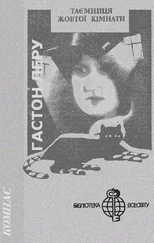Гастон Леру - The Double Life
Здесь есть возможность читать онлайн «Гастон Леру - The Double Life» — ознакомительный отрывок электронной книги совершенно бесплатно, а после прочтения отрывка купить полную версию. В некоторых случаях можно слушать аудио, скачать через торрент в формате fb2 и присутствует краткое содержание. Жанр: literature_20, Классический детектив, foreign_detective, на английском языке. Описание произведения, (предисловие) а так же отзывы посетителей доступны на портале библиотеки ЛибКат.
- Название:The Double Life
- Автор:
- Жанр:
- Год:неизвестен
- ISBN:нет данных
- Рейтинг книги:4 / 5. Голосов: 1
-
Избранное:Добавить в избранное
- Отзывы:
-
Ваша оценка:
- 80
- 1
- 2
- 3
- 4
- 5
The Double Life: краткое содержание, описание и аннотация
Предлагаем к чтению аннотацию, описание, краткое содержание или предисловие (зависит от того, что написал сам автор книги «The Double Life»). Если вы не нашли необходимую информацию о книге — напишите в комментариях, мы постараемся отыскать её.
The Double Life — читать онлайн ознакомительный отрывок
Ниже представлен текст книги, разбитый по страницам. Система сохранения места последней прочитанной страницы, позволяет с удобством читать онлайн бесплатно книгу «The Double Life», без необходимости каждый раз заново искать на чём Вы остановились. Поставьте закладку, и сможете в любой момент перейти на страницу, на которой закончили чтение.
Интервал:
Закладка:
It must be said, though, to his credit, that he was much more puzzled by the mystery of his personality than by the mystery of the treasure, and that he resolved to temporarily suspend his research until the time when he could at least give a name to this personage that he had been-Théophraste Longuet in 1721. That discovery which interested him most came to be in his mind the key of all the others.
That which astonished him most was the sudden development of what he called his “historical instinct,” the instinct which had been deficient in him all his life, but which had been revealed to him with the suddenness and force of a clap of thunder in the depths of the Conciergerie. In one moment, the Other, as he used to say in conversing of this great 18th-century personage, had possessed him. It was the Other who had found the document; it was the Other who had cried out in the Conciergerie; it was the Other who had called to Simon l’Anvergust, and since the Other had disappeared, Théophraste did not know what had become of him. He sought him in vain; he examined himself; he searched his very soul.
Before this adventure Théophraste had no curiosity about the beginning or ending of things, he had not wasted time in wondering over philosophical mysteries; in his vanity he had always shrugged his shoulders at such things. However, now things were different; here was a quiet citizen, with little scientific knowledge, who had to prove that a manufacturer of India rubber in the year 1899 had been shut up in a dungeon after having buried treasures in 1721. But the revelation of this extraordinary fact had come to him spontaneously and remained so fixed in his mind that he resolved to probe the matter to the bottom.
His instinct abandoned him momentarily and he would search books and discover who this powerful, rich person was who had been betrayed on April 1st; which April 1st? This remained to be determined. He haunted the libraries from that time on. He marshaled before him the Premiers of the Kingdom. He found nothing to give him a clue. Some dukes and peers, some illustrious generals, some great financiers, a few princes of the blood. He stopped an instant at Law, but he was too dissipated; at Maurice de Saxe, who ought to have won the Battle of Fontenoy; at the Count du Barry, who had had the most beautiful mistress in Paris. He feared that perhaps he had been the Count de Charolais, who distinguished himself by his debauches, and killed the thatchers on the roofs by shooting at them. He was forty-eight hours the Cardinal of Palegria, but was disgusted when he learned that his Eminence had been a farm hand for the Duchess of Maine. It was refreshing to find in some corner of history a sympathetic count or lord that the writers of the epoch had adorned in engaging colors and on whom they had bestowed some virtues. But Théophraste soon saw that all these would have to be abandoned. For none of them had the principal qualifications of having been shut up in the Conciergerie in 1721, or having been betrayed on an April 1st.
However, in the Journal of the Barber, he discovered a bastard of the Regent, about whom were some startling facts which precipitated him into a state of great excitement.
Before entering into the details, however, of this discovery, we will return to the doings of Marceline and M. Adolphe Lecamus.
CHAPTER IV
Some Philosophy and a Song
LET us leave Paris awhile and return to the little estate on the banks of the Marne, which Théophraste generally moved to with the first rays of the July sun. This year he was to go there before Marceline and his friend, Adolphe, who had been commissioned to survey the timbers on some lands elsewhere. Thus these last few days he could spend alone in security and peace to attend to this unusual treatise which his new position in the world had given him.
The name of the house was “Villa Flots d’Azure.” Théophraste had given it this name against the wishes of Adolphe, who protested that the name was for a villa near the sea. He had replied with logic that he had often gone to the Preport, and that he had always seen the sea green; that he knew the Marne, and that on account of the reflected blue sky the water seemed blue. Do they not say “the beautiful blue Danube”? It was not only the ocean that had blue waves, so he did not see why he should not call his villa on the Marne “Villa Flots d’Azure.”
That day was the anniversary of their marriage. Théophraste was very fond of Marceline, and these anniversaries were always the occasion for much merry-making. Marceline also loved Théophraste, and saw no reason why she should not like Adolphe equally as well, whereas, on the other side, Adolphe adored Marceline and would have died for Théophraste. On reflection, the name “Villa Flots d’Amour” would have been more appropriate than “Villa Flots d’Azure,” such harmony existed therein.
Théophraste shook Adolphe’s hand effusively. He complimented his wife on her beauty. He had his green umbrella that day, and in making his congratulations twirled it in a fashion, as he thought, resembling the manner in which they used canes in the beginning of the eighteenth century. He was not a vain person, but he knew by this scientific miracle that he had been a great man two hundred years ago, and he felt that he should convey the impression that he had moved among great people and affairs.
It was their custom upon their return to their country house to invite a few friends to a party to celebrate the occasion. Upon this occasion Théophraste was at his best. He was in high spirits, and while passing the good word to the gentlemen, made flattering speeches to the ladies. The table was set in the garden under a tent where the guests assembled. After a while the conversation turned to the latest doings in angling. M. Lopard had caught a trout of three pounds; old M. Tartoush had cast his line on Sunday-having caught nothing, complained that people made too much noise shooting during the week, and drove the fish from these waters. All joined in the conversation and gave their experiences except M. Théophraste.
He kept silent. He found the topic too commonplace and felt a desire to raise its level. He wanted it to drift into some subject related to that preoccupying his mind. After awhile he was able to get Adolphe interested in the subject of ghosts. From ghosts the conversation led on to spiritualism. One lady knew a somnambulist and related some strange stories which were calculated to work upon the imagination of the company. Adolphe, upon this, explained the spiritualistic point of view of the phenomena of somnambulism, and cited well-known authorities. He seemed quite in his element, and finally reached the point desired by Théophraste, the transmigration of souls and reincarnation.
“Is it possible,” said Marceline, “that a soul comes back to live in its body? You have often told me so, Adolphe, but it seems to me that one’s reason strongly repulses such an hypothesis.” “Nothing is lost in Nature,” replied Adolphe, positively. “Neither the soul nor the body. All is transformed, the soul as well as the body. The reincarnation of souls at the end of a century is a doctrine which goes back to such great antiquity that the ancient philosophers do not deny it.”
“If one’s soul returned to a body,” said Marceline, “one would surely know it.”
“Not always,” said Adolphe, “but sometimes.” “Ah, sometimes?” asked Théophraste, who was by this time becoming intensely interested.
“Yes, there are cases. For instance: Ptolemy Caesar, son of Caesar and Cleopatra, who was king of Egypt before Christ, remembered well to have been Pythagoras, a Greek philosopher, who lived 600 years before.”
“Impossible!” cried the ladies, and the gentlemen smiled skeptically.
Читать дальшеИнтервал:
Закладка:
Похожие книги на «The Double Life»
Представляем Вашему вниманию похожие книги на «The Double Life» списком для выбора. Мы отобрали схожую по названию и смыслу литературу в надежде предоставить читателям больше вариантов отыскать новые, интересные, ещё непрочитанные произведения.
Обсуждение, отзывы о книге «The Double Life» и просто собственные мнения читателей. Оставьте ваши комментарии, напишите, что Вы думаете о произведении, его смысле или главных героях. Укажите что конкретно понравилось, а что нет, и почему Вы так считаете.





![Гастон Леру - Невеста Солнца [Роман]](/books/415626/gaston-leru-nevesta-solnca-roman-thumb.webp)






